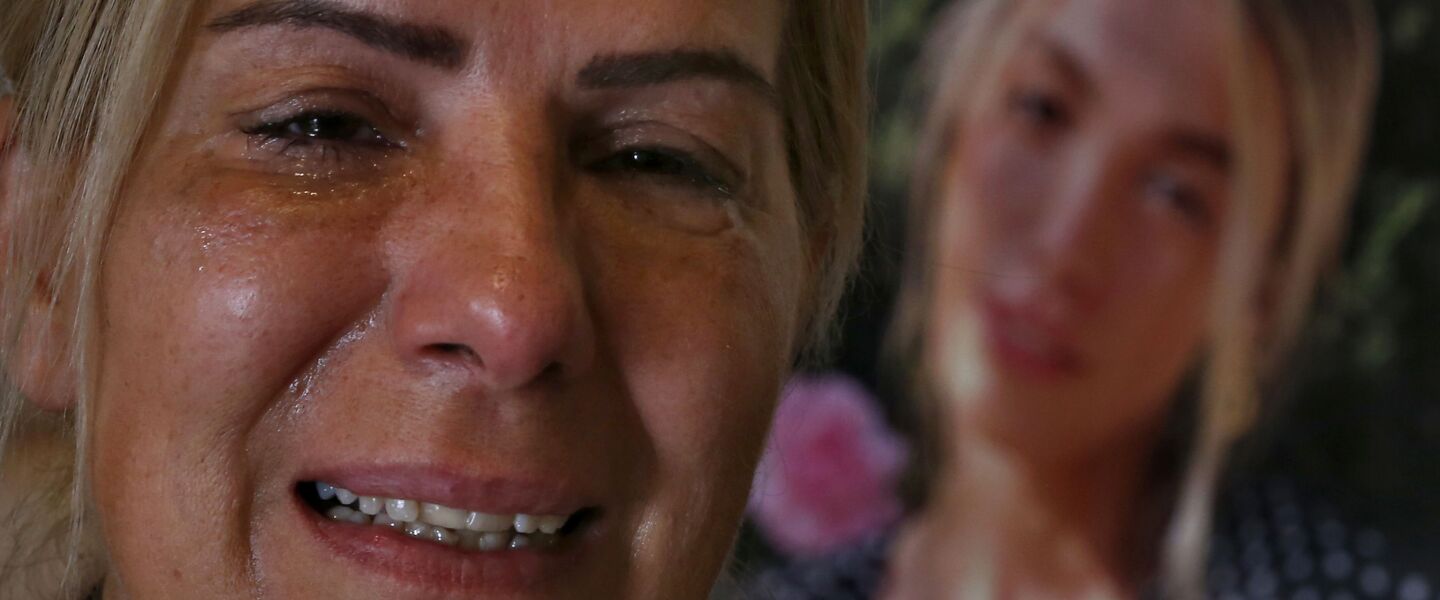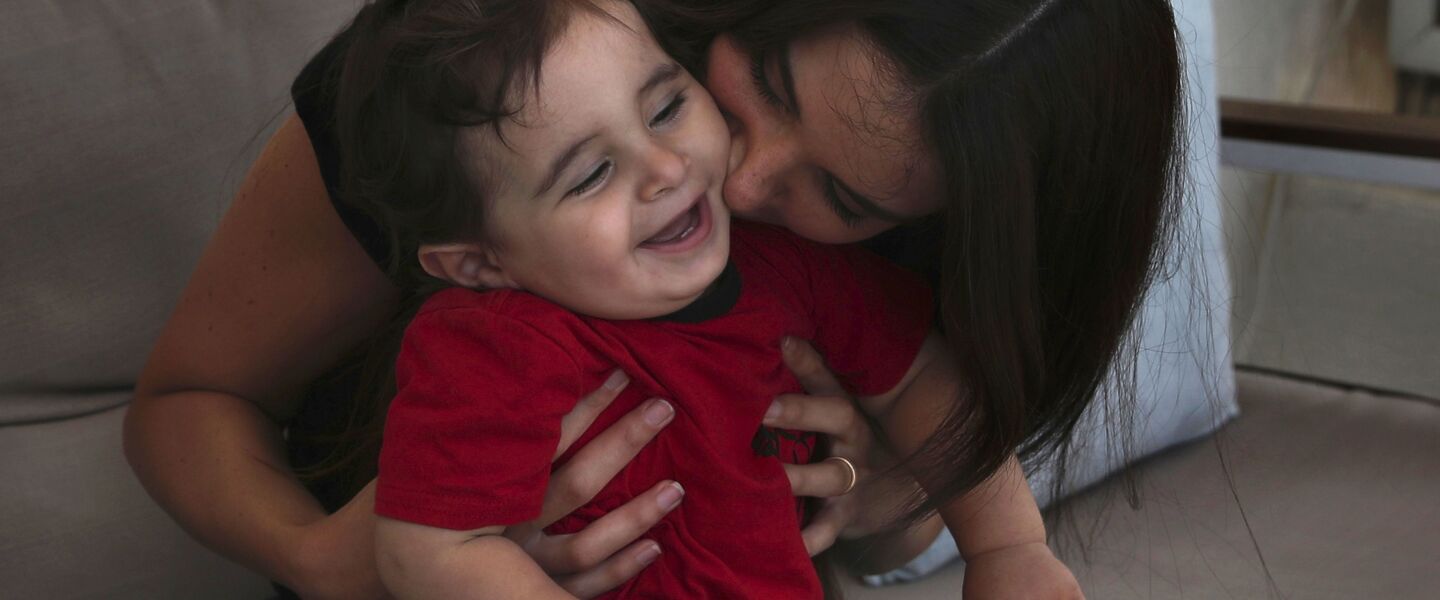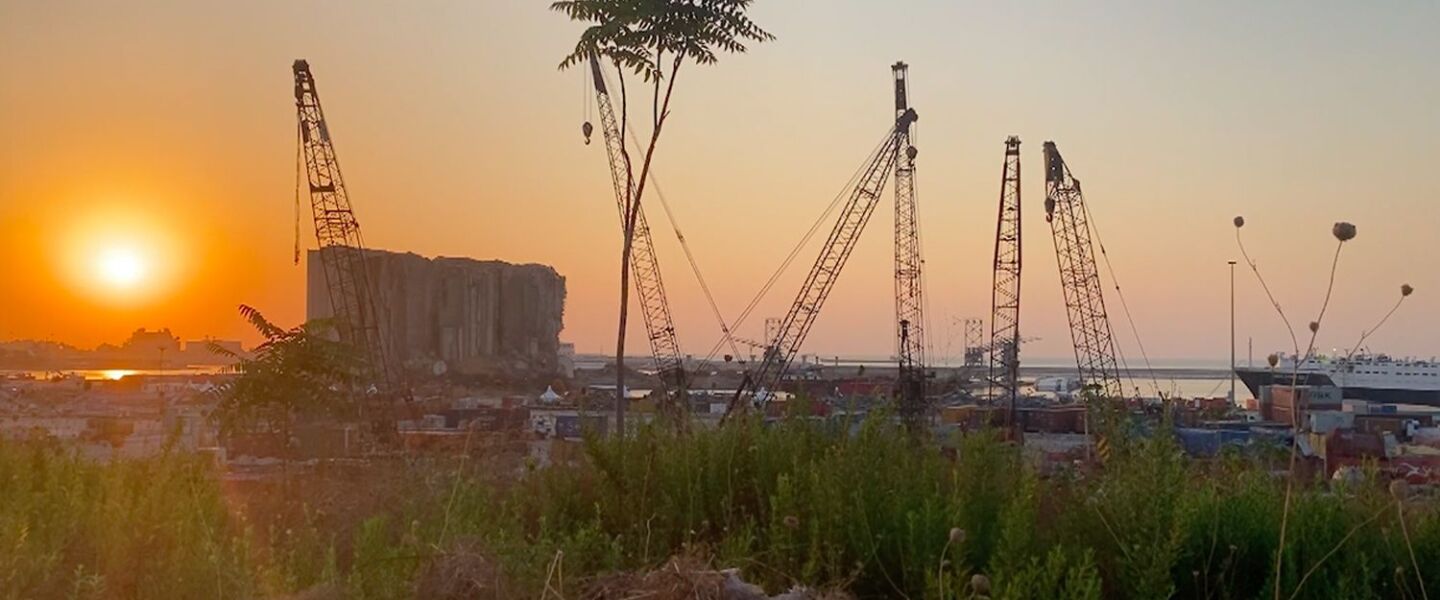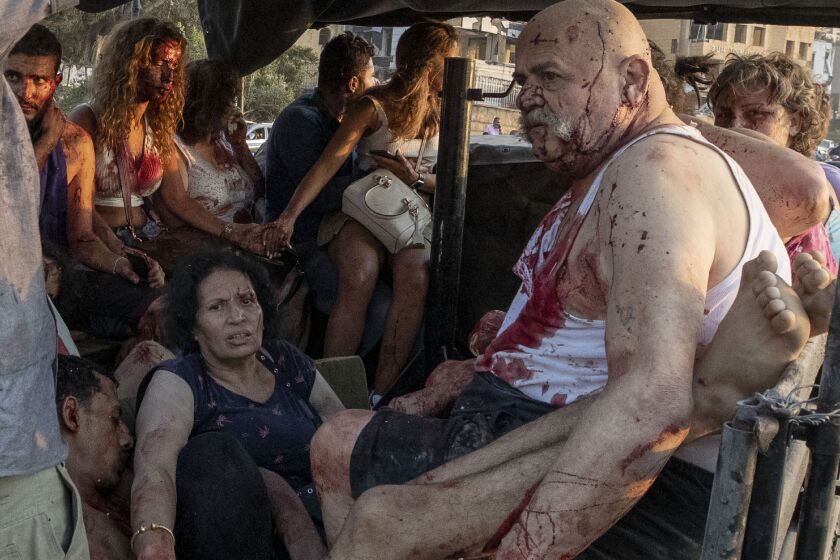Five floors below, Jessica Bezdjian was just coming in through the entrance of Beirut’s St. George Hospital. She was an hour early for her 12-hour shift as a nurse in the psychiatric ward.
That’s when everything exploded.
In every room on every floor in a single instant, windows burst.
Doors flew off their hinges.
Ceilings collapsed.
Equipment toppled.
A wave of dust and pulverized glass surged through the wards and halls.
Out of the darkness and chaos came the screams of bloodied patients, doctors, nurses.
One of Lebanon’s most prestigious and oldest medical centers, St. George stands overlooking the Mediterranean coast about 900 yards from Beirut’s port. On that day a year ago, hundreds of tons of ammonium nitrate improperly stored at a port warehouse blew up in one of the largest non-nuclear explosions in history.
The Aug. 4, 2020, blast tore through the Lebanese capital at 6:07 p.m.
It destroyed entire neighborhoods, killing at least 214 people.
Including 22 at St. George Hospital.
A year later, every moment of that day remains ingrained in the minds of those who lived through it. Many still struggle with the physical and psychological trauma. Some wrestle with the inexplicable loss of a loved one. Some try to grasp what it means to have survived.
“It was the happiest moment in my life and the ugliest one at the same time,” says Edmond Khnaisser, Emmanuelle Khnaisser’s husband.
Emmanuelle Khnaisser’s water broke around 5 that morning. She was going into labor two weeks early. The Khnaissers rushed to the hospital, where she was admitted to a room on the fifth floor.
Emmanuelle, a 29-year-old lawyer, was soon joined by her parents and sister and her husband’s mother and sister.
They awaited the arrival of the baby they knew would be named George.
On the northern outskirts of Beirut, Chouchan Yeghiyan woke up her youngest daughter Jessica at 4 p.m. to get ready. Jessica usually slept for much of the day since she was working overnight shifts at St. George. The 22-year-old loved her work and was saving to pursue a master’s degree.
She ate and took a shower. Once her older sister Rosaline got home around 5:30 p.m., Jessica went downstairs and took the car. She waved goodbye to her father George Bezdjian, who was standing on the balcony as she drove off.
“I wish I didn’t wake her up that day,” her mother says, crying.

Chouchan Yeghiyan weeps in front of a picture of her daughter Jessica Bezdjian, who was killed in last year’s massive blast at Beirut’s seaport. Bezidjian was one of four female nurses whose lost their lives at the Saint George Hospital University Medical Center that day, including her close friend Jessica Kahwaji.
Bilal Hussein / AP
Around 5:45 p.m., the baby’s head could be seen. Emmanuelle was wheeled in to the operating room. Just as Edmond was asking if he could step in, the blast hit.
Ceiling tiles and window frames collapsed onto Emmanuelle. Flying glass showered her from the waist down. Her bed was jolted nearly a yard out of place.
One doctor was thrown under the bed. Another was hit by debris. Their blue-and-white uniforms were splattered with blood.
The machine registering George’s heartbeat broke.
“I was in a state of shock,” Emmanuelle says. “We had no idea what had happened.”
Videos from Edmond’s cellphone show the panic. In one video, he can be heard screaming, “Where is my wife? Stay where you are. Oh, Virgin Mary.”
Bleeding from a mean gash on his leg, he cleared debris off Emmanuelle and started picking glass from her body.
The doctors moved her bed into the emergency exit corridor, where there was less damage.
She was disoriented and didn’t know if her baby was alive. A doctor placed a monitor on her stomach. After a few, tense moments, they heard the heartbeat.
“I felt that there is a reason I should live for. I have to do all I can because I have a big responsibility for George to come to this life,” Emmanuelle says.
She thought about her parents, her husbands’ parents, and “I gathered all my strength and removed all negative ideas and concentrated.”
As she pushed, Emmanuelle could hear people weeping and ambulance sirens blaring. Distraught people rushed past her in and out of the emergency exit, searching for loved ones.
As the evening grew dark, the doctors continued the delivery by the lights of their cellphones.
Edmond ran out briefly to look after his mother, who had suffered broken ribs, and Emmanuelle’s father, who had a head injury.
When he returned, the doctor used forceps to pull George out. At 7:18 p.m., 71 minutes after the blast, the little boy with dark brown hair emerged.
“When George was born, I did not believe that he was crying,” the mother says. “I did not believe that my son was born. When they put him on my chest, I was feeling very guilty and told him ... ‘I’m sorry, my life, that you had to be born this way.’ ”
In one of Edmond’s videos, a nurse can be heard showing a crying baby George to Emmanuelle.
“He is so beautiful,” the nurse tells her.
Usually when Jessica Bezdjian arrived at work, she’d send her mother emojis of kisses or hearts. But on the day of the explosion, at 6:05 p.m., she sent an emoji of an angel. Two minutes later came the horrific boom, earsplitting even at their home about four miles from the port.
When they saw the news about how bad it was, Yeghiyan started screaming: “I feel something in my heart. Maybe the girl died.”
Her husband and their eldest daughter rushed out of the house and drove toward St. George.
Yeghiyan stayed behind and frantically tried to call Jessica. She then knocked on a neighbor’s door and asked him to take her to the hospital. When they hit traffic, Yeghiyan jumped out of the car and stopped a man on a motorcycle. She climbed on the back, and he weaved through the jammed vehicles toward St. George.
The father and daughter got there first. They were told Jessica was in the emergency ward. They assumed she was helping the wounded.
Then, they recognized her from her shoes. She was on the emergency ward floor, with doctors giving her artificial ventilation and pressing on her chest.
Bezdjian saw the gaping wound on his daughter’s neck and her bag, soaked in blood, on the floor.
“I took off my daughter’s shoes and started kissing her feet,” he says. “I asked God, ‘In nine days I will be 60. Take my breath, and give it to her.’ ”
Yeghiyan got there and saw her daughter’s body. She fainted.
Jessica succumbed to her wounds around the same time George was born.
St. George Hospital was in crisis condition. The damage was so great it had to shut down for the first time since it was founded in 1878. The stunned staff evacuated patients, carrying them down the stairs on plastic chairs or sheets. Patients were lined on the pavement outside while medical staff treated urgently injured people outdoors in the main yard.
At the same time, ambulances were rushing in with wounded from around the city. Dr. Alexandre Nehme, the hospital’s chief medical officer, recalls having to tell them: “We don’t exist anymore.”
On the fifth floor, Edmond held his newborn son tightly, afraid of losing him amid the chaos.
Doctors told the couple they needed to get George to another hospital within four hours.
Emmanuelle was carried downstairs on a chair.
Edmond messaged every WhatsApp group on his phone asking whoever was closest to pick them up.
They walked for a block through debris and broken glass to where his brother-in-law was waiting in his badly damaged car.
They drove about five miles and reached a hospital. Only after they were admitted did they discover that the needle of the IV drip had broken off in Emmanuelle’s arm, and the epidural was still stuck in her back.
They spent a week at the hospital as Emmanuelle was treated for an infection. Then, finally, they brought their baby home.

Emmanuelle Khnaisser kisses her 1-year-old sonGeorges Khnaisser at their home in Jal el-Dib, north of Beirut, Lebanon. Khnaisser was in the final stages of labor when last year’s massive Beirut blast tore through the hospital, smashing windows, doors and machines in the operations room and riddling her lower body with tiny pieces of glass.
Bilal Hussein / AP
Shortly before midnight on Aug. 4, 2020, Jessica Bezdijian’s family headed home.
The next day, the hospital called, asking the father to come collect his daughter’s body because there was no electricity in the morgue.
They waited for four days to hold the funeral, until relatives came from abroad. It had the trappings of a wedding, as is sometimes customary in Lebanon for those who die young. The mourners dressed in white. The Armenian Catholic priest offered a prayer said at weddings.
“I thank God that our daughter died in one piece and we were able to bury her,” Bezdjian says in the parent’s apartment in a north Beirut suburb.
Others had to bury pieces of their loved ones’ bodies.
Three days after the funeral, the family took Jessica’s dog Foxy, a Pomeranian, to the cemetery where their daughter was buried. They say they released the dog and watched from a distance as he ran from one grave to another, then jumped on Jessica’s and started yowling.
At their Beirut apartment recently, Emmanuelle and Edmond Khnaisser watch George play.
They’d soon celebrate his first birthday — a few days late out of respect for those killed or injured a year ago.
Emmanuelle says one day she will tell George about his birth amid the blast.
“I will tell him how his birth was a ray of light amid all the darkness.”








